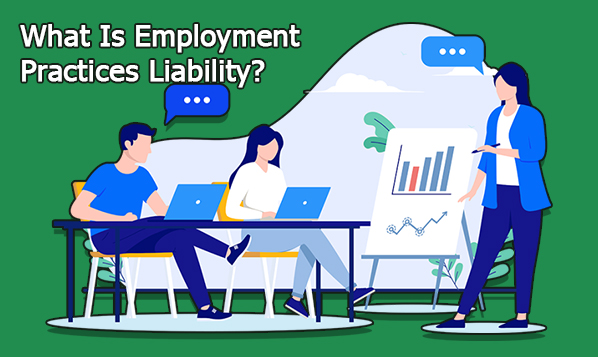Employment practices liability insurance (EPLI) is a coverage type designed to protect against losses incurred during litigation and settlement of wrongful employment practices liability claims. Generally, it’s set up as gap insurance for the business. This type of insurance provides coverage against claims like wrongful discharge, discrimination, and contract violations, which are not covered by general business liability insurance.

In addition, officers’ and directors’ liability insurance covers only the individual, not the business. The most common purpose of EPLI is to close this coverage gap. Moreover, it pays back the expenses incurred in defending a lawsuit, but it does not pay back any fines.
How Does Employment Practices Liability Work
Under EPLI, employees can file claims for acts related to their jobs, such as harassment, discrimination, and demotion. It pays for the expense of defending the company in court as well as any damages or settlements given to plaintiffs. Claims of discrimination against vendors and customers are also covered by certain policies.
Because EPLI policies are claims-made, they insure against lawsuits brought against the company while the policy is in force. Generally, they demand that all claims be filed with the insurer during the duration of the policy. Certain policies may exclude claims from prior acts or cover claims after a retroactive date, typically the first EPLI policy purchased, or occur on or after that date.
What Does Employment Practices Liability Cover
Employment practice liability insurance covers lawsuits brought by present, past, or potential workers who believe their employer violated their civil rights by engaging in unfair practices. This may include discrimination, harassment (including sexual harassment), or unjust dismissal.
Policies may differ, but many pay claims are based on:
- Inappropriate discipline.
- Failure to employ or promote.
- Careless assessment.
- Deprivation of career opportunity.
- Intentional infliction of psychological distress.
- Employee benefits plan mismanagement.
- Retaliation.
- Violation of the employment contract.
Retaliation in employment law refers to legal action taken against an employee for engaging in activities protected by federal law. This may include reporting sex discrimination to management or asking for a reasonable accommodation for a disability.
What Does Employment Practices Liability Not Cover
Numerous employment practice liability policies don’t cover claims for the following:
- Bodily injury or property damage.
- Violations of wage and hour laws.
- Violations of workers compensation laws.
- Labor disputes.
- Dishonesty or fraud.
- Breaking federal laws such as the Worker Adjustment and Retraining Notification Act or the Occupational Safety and Health Act.
- Insurance against unemployment.
- Penalties.
- Fines or penalties, either criminal or civil.
Punitive damages are covered by certain EPLI policies. However, the coverage is limited to states where punitive damages are insured. Also, punitive damage insurance is banned in many states.
Who Needs Employment Practices Liability
Given that all employers have employees, it is easy to argue that they should all purchase EPLI. However, not all employers have the same risk profile when it comes to hiring practices, which means that different employers have different insurance requirements.
The following are some variables that affect an organization’s exposure to claims of wrongful employment practices:
- The organization’s size.
- Operational nation Industry.
- Staff attrition.
- Investment in risk management for employment practices.
Remember that the EPLI risk profile of an organization varies. Moreover, it might change over time as the company develops, grows, enters new markets, reorganizes, or enters a different sector of the economy.
How Much Does Employment Practices Liability Cost
The insurance provider must evaluate the risk involved in selling an EPLI policy before setting a price. The following factors could affect the cost of the policy:
- The policy’s liability limit.
- Coverage’s size.
- Exclusions.
- Terms, and retention(s) or deductibles.
- The organization purchasing the policy’s attributes, including its size, number of employees, revenue, industry, and claims history.
- The standard of its hiring procedures.
Generally speaking, the following traits raise the risk exposure:
- A significant labor force.
- A business that interacts with the public, like retail or entertainment.
- Insufficient training, policies, or procedures for human resources.
- Elevated staff attrition.
- Geographical location: operating entirely or partially within a jurisdiction that is rife with lawsuits.
- Past EPLI allegations.
Organizations and industries’ characteristics are challenging to manage, but investing in ethical hiring procedures can help. Insurance companies consider an organization’s employment practices risk management when determining its suitability for insurability and EPLI underwriting, impacting policy premiums and coverage. Furthermore, companies planning to purchase EPLI should prioritize effective risk management before contacting an insurance provider.
Major Benefits of Employment Practices Liability
Employment practices liability insurance covers companies from lawsuits arising from workers’ claims of unfair treatment and reprisal. Your EPLI will cover the cost of your defense as well as any award or settlement if an employee files a discrimination lawsuit against your company. If you own a business, you should consider getting EPLI because, if you are found liable, employment-related claims may yield sizable settlements.

